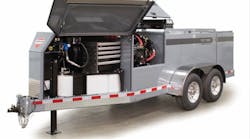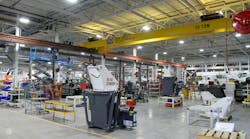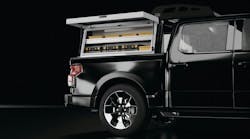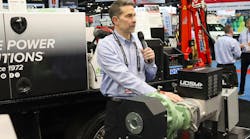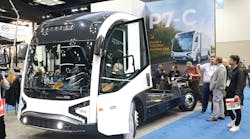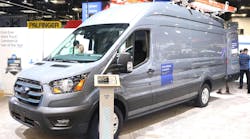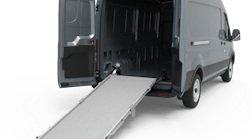When it comes to selecting a material to build a platform body, steel seems to be the simple choice, with aluminum serving the needs of those who want to save weight.
But to hear America's Body Company tell it, there's something to be said for composites. For some applications, there's a lot to be said.
The company, which started out exclusively as a truck equipment distributor, has developed a line of composite platform, stake, and contractor bodies targeted for customers that can benefit from the physical properties offered by rotational molding and sheets of copolymer.
For example:
-
Plastics are poor conductors of heat. By making the floors of 3/4" copolymer, loads do not freeze to the body as easily. As such, dirt can be dumped more easily when temperatures are below freezing.
-
During the summer, when temperatures are scorching, these same floors remain cooler than those made of steel. This helps landscapers transport plants without as much risk of burning tender roots.
-
The resin material that America's Body Company uses for its floors are translucent. When the body is raised, the driver can see through the floor to determine if the load has dumped fully. The reduced friction of the single-piece flooring material helps make that possible.
-
Rotomolded stake sides are designed to lock together without hardware.
-
The stake sides tend to flex on impact, rather than dent.
-
The material does not emit as much noise as stake sides made of steel.
-
It can be engineered to meet the strength requirements of steel while reducing weight.
-
The 3/8" black extruded composite panels for the sidewalls of landscaper and contractor bodies are crack and impact resistant.
The sheets of resin and the rotomolded stakes supplement — not eliminate — the use of steel framework. The result is America's Body Company's Rugged American line of platform, stake, landscaper, and contractor bodies.
“We wanted to see if we could go one step farther in the use of these materials in truck bodies,” says Scott McLeod, Rugged American engineering. “We wanted to get rid of latches on stake bodies. We tried vacuum forming and injection molding before discovering the advantages that rotational molded polyethylene provides. It's a material that's flexible and durable.”
Overcoming obstacles
As with most materials, rotational molded polyethylene has other properties that require additional solutions. For example, it is difficult to get it to hold fasteners. America's Body Company solved this by molding brass inserts into the stakes, enabling the polyethylene slats to be secured to the steel uprights. Two steel verticals are combined with the polyethylene slats to make each stake panel. The design also uses the strength of the steel verticals to secure D-rings.
The panels are interchangeable, meaning that it makes no difference how they are positioned on the body. They lock together without latches, regardless of orientation.
America's Body Company also had to design the body to allow for the expansion of the polyethylene floor.
“Plastic expands more than steel,” McLeod says. “We had to come up with a design that would permit expanding pieces to work with one another and not place them in conflict.”
That was particularly true of the floor. America's Body Company had to let the 3/4" sheet of copolymer float within the steel frame. A copolymer floor can expand as much as 1½" between -20° and +120° F.
“A ¾" sheet of the copolymer that we use is equal in strength to a sheet of seven-gauge steel,” McLeod says.
The result is a body that offers advantages over steel while saving weight. A composite 18-ft stake body can save up to 425 pounds when compared with a steel body, McLeod says.
Separate manufacturing plant
To help America's Body Company manufacture truck bodies, the company acquired a separate 65,000-sq-ft building in 2005.
The plant is a short drive down the street from the company's truck equipment distribution facility in Louisville, Kentucky. The building, formerly a warehouse for a storage company, is one of three locations America's Body Company has in Louisville. The others — on Westport Road near Ford's Kentucky Truck Plant, Fern Valley, and Shelbyville — are ship-through points for truck equipment distribution. Each of the three provides ship-through services for a different region of the country.
